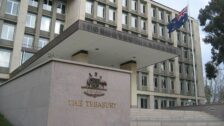SMEs persist with advice subsidy push to new government
The COVID-19 pandemic hit small business hard, and that was quickly recognised by government support programs, with the federal JobKeeper program front and centre. But as JobKeeper wound down last year, a group of accounting and small business groups pooled ideas on what kinds of ongoing assistance might tangibly help small businesses navigate the post-pandemic environment.
CPA Australia, Chartered Accountants Australia and New Zealand, the Institute of Public Accountants (IPA), the Institute of Certified Bookkeepers (ICB), the Australian Small Business and Family Enterprise Ombudsman and the Council of Small Business Organisations Australia (COSBOA) jointly proposed a program to help viable small businesses access financial and business advice, in the form of vouchers or grants.
As proposed, the program would give small businesses with annual turnover of up to $10 million a subsidy of up to $5,000 to access a 15-month financial plan from an accredited advisor.
“We put the proposal to the former government, but it didn’t make it into its Budget in March,” says Tony Greco, general manager, technical policy, at the IPA. “Then the election intervened. We’ve engaged with the new government, but it has been clear that its priorities lie in implementing what it took to the election, and this isn’t one of them.”
But while this means the advice subsidy will not be in the October Budget, it is very much a “live proposal,” says Greco. “We’ve taken the proposal to both the Treasurer and the Small Business Minister, we’ve had conversations with both offices, and we’ll keep engaging. We’re not going to let this go, but we have to be realistic, we need to chisel away.”
Matthew Addison, executive director of the ICB and chair of COSBOA, says many small businesses are still in “survival mode” at this stage of the COVID recovery. “With the range of issues impacting how they do business ranging from cost increases, labour shortages, supply chain issues and the residual effects of three years of COVID impacts means SMEs is operating in survival mode today.
“Many SMEs are reporting the tiredness from sustaining their businesses through the three years. Their financial resources have been invested back into the business. We would welcome government support for both advice and adoption of appropriate digitisation of their processes.”
The proposal is not just about investment and superannuation: “We are looking to improve their capacity to engage their existing adviser – or another appropriate professional – who understands business and the way to improve their business,” Addison says.
While the kind of advice to be covered is not exactly defined, Greco says the reality of many small and family-run enterprises is that “their business is their investment and their superannuation,” and the focus is on helping proprietors make the necessary adjustments to ensure their business is viable.
“Investment advice may be a part of that, but we do see it as more for the kind of pressing questions that businesses face coming out of COVID, such as, is this the right structure to run my business, should I put on more employees, should I go more digital than I am, how do I maximise my cashflow, how do I deal with all of the headwinds coming my way in terms of regulation, how do I maximise my export opportunities,” he says.
Some of the state governments have already weighed-in to this area, says Greco: the Victorian Government’s Small Business Specialist Advice Pathways Program and Tasmania’s COVID-19 Small Business Advice and Financial Guidance Program are examples of similar schemes. “The Victorian scheme was $5 million; it reached full capacity within two or three days. That’s how big the appetite is for subsidised advice,” he says. Addison echoes this, saying “It would be great to have a nationally consistent support framework for the SME sector.”
For now, however, the proposal is mired in the competing priorities of a new government keen to differentiate itself from its predecessor.
“We’re quite encouraged that in August, the Treasury released for comment exposure draft legislation setting out the proposed small business skills and training boost and the small business technology investment boost, which were announcement by the previous government in its March 2022 Budget,” Greco says. “They were temporary tax incentives to support small businesses, so we feel that the government is willing to look very closely at ways that it can support the sector.”










